
Journal of Agriculture Food Systems and Community Development
Scope & Guideline
Championing Interdisciplinary Approaches to Agriculture
Introduction
Aims and Scopes
- Sustainable Agriculture Practices:
The journal promotes research on sustainable agriculture methods that enhance productivity while minimizing environmental impact, including agroecology, regenerative farming, and organic practices. - Food Justice and Equity:
There is a strong emphasis on food justice, exploring how social, economic, and racial inequalities affect food access and security, and advocating for policies that promote equity in food systems. - Community Engagement and Development:
Research often focuses on community-based approaches to food systems, examining how local initiatives can strengthen food security and foster community resilience. - Policy Analysis and Advocacy:
The journal includes studies that analyze food policies at local, national, and international levels, aiming to inform and advocate for effective food governance and community rights. - Interdisciplinary Approaches:
It encourages interdisciplinary research that integrates perspectives from sociology, economics, environmental science, and public health to address complex food system challenges.
Trending and Emerging
- Climate Change and Food Systems:
Recent publications increasingly address the impacts of climate change on food systems, emphasizing adaptive strategies and sustainability practices to mitigate these effects. - Food Sovereignty Movements:
There is a growing interest in food sovereignty, exploring grassroots movements and community-led initiatives that seek to empower local populations to control their food systems. - Health and Nutrition Intersections:
The journal is emphasizing the links between food systems and public health, particularly in the context of nutrition security and health disparities, highlighting the role of food environments. - Technological Innovations in Agriculture:
Emerging research on the role of technology, including precision agriculture and digital tools, in enhancing food production efficiency and sustainability is gaining traction. - Social and Racial Justice in Food Systems:
An increasing number of studies are focusing on social justice issues within food systems, particularly how race, gender, and socioeconomic status intersect to affect food access and security.
Declining or Waning
- Traditional Agricultural Practices:
Research focused solely on traditional farming methods without an emphasis on sustainability or innovation has become less frequent, as the journal pivots towards modern, sustainable practices. - General Food Production Statistics:
There seems to be a decline in publications that merely present statistical analyses of food production without contextualizing them within broader social or environmental frameworks. - Single-Dimensional Food Security Studies:
Studies that approach food security from a solely economic perspective, without considering social, cultural, or community dimensions, are less common, indicating a shift towards more holistic views.
Similar Journals

International Journal of Agricultural Sustainability
Empowering Change Through Agricultural ResearchThe International Journal of Agricultural Sustainability, published by Taylor & Francis Ltd, is a leading platform for researchers and professionals in the field of agricultural science, economics, and sustainability. With an impact factor that reflects its strong academic credibility and contribution to the field, the journal has earned esteemed rankings, including Q1 in Agronomy and Crop Science and Q2 in Economics and Econometrics for 2023. Engaging an audience keen on advancing sustainable agricultural practices, the journal has embraced Open Access since 2023, facilitating broader dissemination of vital research findings. With Scopus ranks placing it in the top quartiles and percentiles within its categories, the International Journal of Agricultural Sustainability aims to foster interdisciplinary dialogue and innovative approaches to agricultural sustainability, making it an essential resource for students, researchers, and industry professionals alike.

International Food and Agribusiness Management Review
Shaping the Future of Food and Agribusiness WorldwideInternational Food and Agribusiness Management Review, published by Wageningen Academic Publishers, is a leading journal in the fields of business and international management and food science. Since its inception in 1998, this open-access journal has been dedicated to disseminating innovative research and practical insights that bridge the gap between business practices and agribusiness management. With an impressive Q2 ranking in both its categories, it serves as a vital platform for researchers, professionals, and students alike, enabling them to engage with current trends and developments in the agrifood sector. The journal is indexed in Scopus, featuring a strong ranking in both Business and International Management and Agricultural and Biological Sciences, reflecting its impact and relevance in today's global food system. As it continues up to 2024, the International Food and Agribusiness Management Review remains a pivotal resource for those looking to advance knowledge in this dynamic and critical industry.
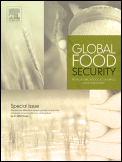
Global Food Security-Agriculture Policy Economics and Environment
Empowering researchers to reshape food security landscapes.Global Food Security - Agriculture Policy Economics and Environment is a leading interdisciplinary journal published by Elsevier that addresses critical issues in food security through the lens of agriculture, economics, and environmental sustainability. With an impressive impact factor and a distinguished placement in the Q1 quartile across multiple categories including Ecology, Food Science, and Safety Research for 2023, this journal is a vital resource for researchers and practitioners aiming to address modern challenges in global food systems. Covering essential topics from agricultural policy to ecological implications, the journal provides a platform for innovative research and policy discussions that foster the advancement of food security on a global scale. Notably, it is indexed in Scopus, where it ranks in the top percentiles across its relevant categories, reflecting its significance in the field. The journal is accessible to a wide audience, making it an indispensable source of knowledge for professionals and students aiming to tackle the complex interplay between food production and environmental stewardship.

Food Security
Leading the Charge in Food Security ResearchFood Security is a premier academic journal dedicated to advancing knowledge and fostering dialogue surrounding the critical issues of food security and sustainability in a rapidly changing world. Published by Springer, this journal has established itself as a leading voice in the fields of Agronomy, Crop Science, Development, and Food Science, reflected in its impressive Q1 quartile rankings across these disciplines for 2023. With an impact factor showcasing its significant influence, Food Security is ranked in the top echelon of its domain, with notable positions in Scopus indices (Rank #7 in Agronomy and Crop Science, Rank #6 in Development, and Rank #13 in Food Science). Spanning articles from 2010 to 2024, the journal serves as a critical resource for researchers, professionals, and students seeking to address the complex interplay of agricultural practices, socio-economic dynamics, and environmental factors that contribute to food availability and accessibility on a global scale. While primarily subscription-based, Food Security ensures that its audience remains engaged with the latest research, policy discussions, and innovative solutions to combat food insecurity worldwide.
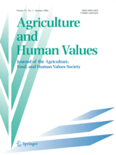
AGRICULTURE AND HUMAN VALUES
Fostering dialogue on food systems and societal impact.AGRICULTURE AND HUMAN VALUES is a leading interdisciplinary journal published by SPRINGER, focusing on the intricate relationships between agricultural practices, environmental sustainability, and human well-being. With an impressive impact factor and ranking in the Q1 quartile across various fields including Agronomy and Crop Science, Geography, Planning and Development, and Sociology and Political Science, this journal provides a vital platform for researchers and professionals to explore the social, economic, and cultural dimensions of agriculture. As a prominent outlet since its inception in 1984, it aims to contribute to the dialogue on sustainable practices and policies that impact food systems globally. The journal caters to a diverse readership, including scholars, policymakers, and students, ensuring that critical research findings reach those who can influence change. With a solid reputation and commitment to advancing knowledge in these essential areas, AGRICULTURE AND HUMAN VALUES remains an invaluable resource for those dedicated to improving agricultural practices and human health in a rapidly changing world.
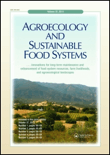
Agroecology and Sustainable Food Systems
Exploring the intersection of ecology and food security.Agroecology and Sustainable Food Systems, published by Taylor & Francis Inc, is a premier academic journal dedicated to advancing the science of agroecology and its applications in sustainable food systems. With an impact factor that reflects its significant influence in the field, this journal serves as a vital resource for researchers, industry professionals, and students engaged in sustainability, agriculture, and environmental studies. As of 2023, it proudly holds a Q1 ranking in Agronomy and Crop Science, as well as Q2 rankings in Development and Renewable Energy, Sustainability, and the Environment categories. Covering a broad spectrum of topics, it not only shares peer-reviewed research but also encourages discourse on innovative practices and policies that enhance food security and ecological balance. Available for access through various options including Open Access, the journal's commitment to knowledge dissemination is further underscored by its substantial rankings on Scopus, with notable percentiles across multiple disciplines. By focusing on agroecological principles and their socio-economic implications, Agroecology and Sustainable Food Systems is essential for those looking to stimulate meaningful change in agricultural practices and sustainability initiatives worldwide.
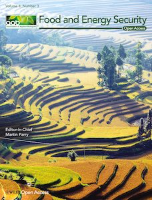
Food and Energy Security
Advancing Sustainable Solutions for Global Food and Energy ChallengesFood and Energy Security, an esteemed journal published by WILEY, is dedicated to advancing the fields of food science, agriculture, and renewable energy. Since its inception in 2012, this open-access journal has provided a platform for groundbreaking research and innovative practices that address global challenges related to food production and energy sustainability. With an impressive impact factor reflected in its Q1 quartile rankings across notable categories such as Agronomy and Crop Science and Food Science, this journal is instrumental for researchers and practitioners alike who are focused on enhancing food security and promoting sustainable energy solutions. The journal's scope encompasses multidisciplinary approaches and encourages submissions that explore the intersection of food systems and energy dynamics, ensuring relevance in the evolving landscape of environmental science and policy. By offering open access to its publications, Food and Energy Security commits to making vital research accessible, fostering informed dialogue and collaboration among scholars, policymakers, and the agrifood industry worldwide.

Journal of Agriculture and Environment for International Development
Cultivating Knowledge for International DevelopmentJournal of Agriculture and Environment for International Development, published by AGENZIA ITALIANA COOPERAZIONE SVILUPPO-ITALIAN DEV COOP AGENCY, is a vital platform advancing research at the intersection of agricultural practices, environmental sustainability, and international development. Since its inception, this Open Access journal has aimed to disseminate knowledge and innovative strategies that address global challenges in the agri-environment sector. With ISSN 2240-2802, this esteemed publication is situated in Italy and has maintained an unwavering commitment to accessibility since 2011, encouraging widespread engagement amongst researchers and practitioners. Although currently ranked in the Q4 quartile across various categories including Agricultural and Biological Sciences and Environmental Science, the journal is dedicated to covering crucial topics that contribute to sustainable development, thus serving as an invaluable resource for scholars and policymakers alike. The convergence years from 2016 to 2024 reflect the journal's adaptive approach to evolving global trends, ensuring its relevance in a rapidly changing academic landscape.
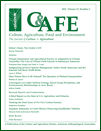
Culture Agriculture Food and Environment
Unraveling the Cultural Threads of Agriculture and EcologyCulture Agriculture Food and Environment, published by WILEY, is an esteemed journal that serves as a pivotal platform for interdisciplinary research at the intersection of cultural studies, anthropology, and agricultural sciences. With its ISSN 2153-9553 and E-ISSN 2153-9561, this journal aims to foster scholarly dialogue on the complex relationships between food, culture, and environmental sustainability. As of 2023, it proudly holds a Q2 ranking in Agricultural and Biological Sciences and Anthropology, as well as a Q1 ranking in Cultural Studies, indicating its significant impact within these disciplines. Researchers and professionals will appreciate its rigorous peer-review process and diverse coverage, which extends from 2011 to 2024, reflecting ongoing debates and innovations in the field. Although open access options are not provided, the journal's commitment to advancing knowledge in understanding food systems and cultural practices makes it a vital resource for academics and practitioners alike, promoting a deeper understanding of the cultural dimensions of agriculture and the environment.
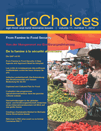
EuroChoices
Illuminating contemporary issues through rigorous research.EuroChoices, published by WILEY, is a leading journal in the fields of economics and geography, demonstrating a significant impact as evidenced by its exceptional rankings—Q1 in both Economics, Econometrics and Finance and Geography, Planning and Development for 2023. With an ISSN of 1478-0917 and an E-ISSN of 1746-692X, this esteemed journal has been a pivotal platform for scholarly discourse since its inception in 2003, evolving thoughtfully to encompass contemporary issues and trends through 2024. Situated in the United States, it serves as an essential resource for researchers, professionals, and students alike, offering insights that bridge economic theories with geographical perspectives. While it maintains a traditional publishing approach without open access options, the journal continues to thrive, achieving high ranks in Scopus—with Economics positioned 37th out of 242 and Geography at 151st out of 821—highlighting its role as a critical contributor to the academic community.